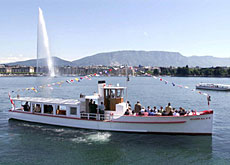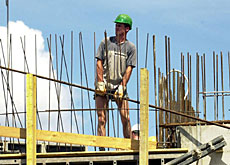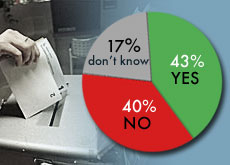Labour treaty dampens Europhile fervour

Enthusiasm for Europe appears to be waning in French-speaking Switzerland, ahead of a vote on opening the labour market to the EU's new member states.
Voters in Geneva – Switzerland’s most pro-European Union canton – have become decidedly less keen on closer ties with Brussels, if public discourse is anything to go by.
A few months ago the thought of Geneva voting no on September 25 was almost unimaginable – no one could conceive that the most pro-Europe of Switzerland’s cantons would entertain the idea of turning down closer integration with the EU.
But now no one is writing off the possibility that a majority of voters in Geneva will reject the free movement accord, one of seven bilateral treaties between Switzerland and the EU concluded in 1999.
These doubts are explained by the very direct impact the vote in September will have on Swiss jobs – something opponents of the accord don’t hesitate to point out.
“It is job security in Switzerland that is under threat,” says Christian Grobet, a former parliamentarian and head of the Leftwing Alliance in Geneva, a coalition of leftwing extremists.
“Workers from eastern Europe who earn much less than workers in Switzerland will put an enormous pressure on Swiss wages.”
Grobet says Genevans have already noticed this effect with workers who commute across the border from France.
Rising unemployment
“Within the past two years [French cross-border workers] have increased to 10,000 and over the same period unemployment has gone up in Geneva,” he says. “These laid-off workers have been replaced by cheaper Europeans.”
Georges Tissot, head of the professional workers’ union, disputes Grobet’s explanation. “The number of cross-border commuters [from France] has indeed increased, but this is explained by the drop in workers coming from Portugal, Spain or Italy.”
Tissot denies French workers are the reason for a rise in unemployment in Geneva. But he acknowledges that their presence alarms many Swiss, who are already worried about wage dumping and more competition in the job market.
“Since last summer, cross-border commuters have been able to get low-qualified jobs in sectors such as catering or construction,” he says.
For all that, Tissot is not afraid of an avalanche of European workers seeking work in Switzerland – even those commuting across the border.
He believes that the accord’s accompanying measures – which will be adopted in the event of a yes on September 25 – offer better protection for workers.
Euro-scepticism
For political analyst René Schwock the evident euro-scepticism emerging in French-speaking Switzerland should not be seen as new.
“Since 1992, when the Swiss rejected membership of the European Economic Area, attitudes towards Europe have got closer between French- and German-speaking Switzerland.
“In a very ideological debate on Europe, Switzerland is now considering much more workaday factors.”
Christophe Zimmermann, co-director of Swiss market research institute Erasm, agrees. “In 1992, the pro-Europeans saw joining the EU as a way of ridding Switzerland of its archaisms. This perspective was like a breath of fresh air.”
“Since then, Switzerland has rediscovered its policy of strict protectionism… and a desire to treat all of its partners the same – whether European or otherwise,” he says.
swissinfo, Frédéric Burnand in Geneva
A bilateral agreement between Switzerland and the EU on the free movement of people came into force on June 1, 2002.
This allows EU residents to live and work in Switzerland, and vice-versa.
On September 25 Switzerland is to vote on whether this agreement should be extended to the ten countries that joined the EU on May 1, 2004: Estonia, Latvia, Lithuania, Poland, Slovakia, Slovenia, the Czech Republic, Hungary, Cyprus and Malta.
The extension of the free movement of people to the ten new members of the EU has already been accepted by the Swiss parliament.
A referendum was forced by the far-right Swiss Democrats Party, who gathered the necessary signatures.
On June 5 Swiss voters voted in favour of the Schengen and Dublin accords on closer ties on security and asylum issues with the EU by a majority of 54.6 per cent.

In compliance with the JTI standards
More: SWI swissinfo.ch certified by the Journalism Trust Initiative



You can find an overview of ongoing debates with our journalists here . Please join us!
If you want to start a conversation about a topic raised in this article or want to report factual errors, email us at english@swissinfo.ch.